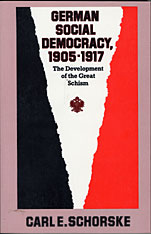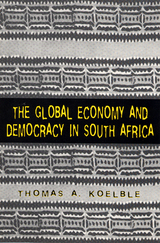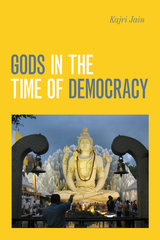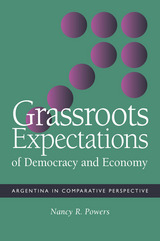10 start with G start with G

Treating Bataille's work as a whole rather than focusing, as other studies have done, on aspects of his work (i.e. as social theory or philosophy), Noys' study is intended to be sensitive to the needs of students new to Bataille's work while at the same time drawing on the latest research on Bataille to offer new interpretations of Bataille's oeuvre for more experienced readers. This is the first clear, introductory reading of Bataille in English - challenging current reductive readings, and stressing the range of disciplines affected by Bataille's work, at a time when interest in Bataille is growing.


How does a country reconstitute itself as a functioning democracy after a period of dictatorship? The new community may execute, imprison, or temporarily disenfranchise some citizens, but it will be unable to exclude all who supported the fallen regime. Political reconciliation must lay the groundwork for political trust. Democracy offers the compromised--and many who were more than just compromised--a second chance.
In this new book, Anne Sa'adah explores twentieth-century Germany's second chances. Drawing on evidence from intellectual debates, trials, literary works, controversies about the actions of public figures, and partisan competition, Sa'adah analyzes German responses to the problem of reconciliation after 1945 and again after 1989. She depicts the frustrations, moral and political ambiguities, and disappointments inherent to even successful processes of democratization. She constantly underscores the difficult trade-off between achieving a modicum of justice and securing the legitimacy and stability of the new regime. A strategy of reconciliation emphasizing outward conformity to democratic norms and behavior, she argues, has a greater chance of sustaining a new and fragile democracy than do more direct attempts to punish past misdeeds and alter people's inner convictions.



Roger Magazine takes readers inside Mexico’s soccer stadiums to explore young men’s participation in struggles over the future of that country’s urban society. His firsthand observations of the fan clubs—las porras—yield a unique inside look at confrontations in the stands over group organization, particularly at the emergence of rebel segments within the clubs. His study offers a close-up look at ground-level struggles over social organization in contemporary urban Mexico, showing how young male fans both blindly reproduce and consciously manipulate images of violence and disorder derived from national myths about typical urban Mexican men.
Golden and Blue Like My Heart offers a new way of understanding the dynamics of fandom while shedding new light on larger social processes and youth culture in Mexico. And with its insight into soccer culture, politico-economic transition, and masculinity, it has important and wide-reaching implications for all of Latin America.

Few would disagree that Western democracies are experiencing a crisis of representation. In the United States, gerrymandering and concentrated political geographies have placed the Congress and state legislatures in a stranglehold that is often at odds with public opinion. Campaign financing ensures that only the affluent have voice in legislation. Europeans, meanwhile, increasingly see the European Union as an anti-democratic body whose “diktats” have no basis in popular rule. The response, however, has not been an effective pursuit of better representation. In Good Government, Pierre Rosanvallon examines the long history of the alternative to which the public has gravitated: the empowered executive.
Rosanvallon argues that, faced with everyday ineptitude in governance, people become attracted to strong leaders and bold executive action. If these fail, they too often want even stronger personal leadership. Whereas nineteenth-century liberals and reformers longed for parliamentary sovereignty, nowadays few contest the “imperial presidency.” Rosanvallon traces this history from the Weimar Republic to Charles De Gaulle’s “exceptional” presidency to the Bush-Cheney concentration of executive power.
Europeans rebelling against the technocratic EU and Americans fed up with the “administrative state” have turned to charismatic figures, from Donald Trump to Viktor Orbán, who tout personal strength as their greatest asset. This is not just a right-wing phenomenon, though, as liberal contentment with Obama’s drone war demonstrates. Rosanvallon makes clear that contemporary “presidentialism” may reflect the particular concerns of the moment, but its many precursors demonstrate that democracy has always struggled with tension between popular government and concentrated authority.

This highly readable study addresses a range of fundamental questions about the interaction of politics and economics, from a grassroots perspective in post-transition Argentina. Nancy R. Powers looks at the lives and political views of Argentines of little to modest means to examine systematically how their political interests, and their evaluations of democracy, are formed. Based on the author’s fieldwork in Argentina, the analysis extends to countries of Latin America and Eastern Europe facing similarly difficult political and economic changes.
Powers uses in-depth interviews to examine how (not simply what) ordinary people think about their standard of living, their government, and the democratic regime. She explains why they sometimes do, but more often do not, see their material conditions as political problems, arguing that the type of hardship and the possibilities for coping with it are more politically significant than the degree of hardship. She analyzes alternative ways in which people define democracy and judge its legitimacy.
Not only does Powers demonstrate contradictions and gaps in the existing scholarship on economic voting, social movements, and populism, she also shows how those literatures are addressing similar questions but are failing to “talk” to one another. Powers goes on to build a more comprehensive theory of how people at the grassroots form their political interests. To analyze why people perceive only some of their material hardships as political problems, she brings into the study of politics ideas drawn from Amartya Sen and other scholars of poverty.

In Greek Media Discourse, Nikoletta Tsitsanoudis-Mallidis examines the changes in the form and symbolism of the language utilized by the media in Greece since the fall of the dictatorship in 1974, revealing linguistic reflections of important economic and political changes of the country. She argues that the language took a more grassroots approach because it served the climate of the restoration of democracy. It took on progressive implications by distancing from more formal approaches, facilitating political alliances and raising popular expectations.
Greek language took a more populist turn when private media sought opportunities within the lower and lower-middle classes. Language both influenced, and was influenced by, an embrace of politics through the “authority” it had gained via television and publishing. It also lost and regained the role of representing the campaigns of the common people. In the era of memoranda it became a sharp tool of manipulation, aiming at the coercive acceptance of harsh economic measures.
Finally, Tsitsanoudis-Mallidis demonstrates the way language provokes critical debate, with questions about how ultimately democratic are the forces that shape a discourse with such a “biased” projection as journalism, leaving unanswered the final question: How pedagogical can a public discourse be when it loses its democracy as a social good?

The NRA steadfastly maintains that the 30,000 gun-related deaths and 300,000 assaults with firearms in the United States every year are a small price to pay to guarantee freedom. As former NRA President Charlton Heston put it, "freedom isn't free."
And when gun enthusiasts talk about Constitutional liberties guaranteed by the Second Amendment, they are referring to freedom in a general sense, but they also have something more specific in mind---freedom from government oppression. They argue that the only way to keep federal authority in check is to arm individual citizens who can, if necessary, defend themselves from an aggressive government.
In the past decade, this view of the proper relationship between government and individual rights and the insistence on a role for private violence in a democracy has been co-opted by the conservative movement. As a result, it has spread beyond extreme "militia" groups to influence state and national policy.
In Guns, Democracy, and the Insurrectionist Idea, Josh Horwitz and Casey Anderson reveal that the proponents of this view base their argument on a deliberate misreading of history. The Insurrectionist myth has been forged by twisting the facts of the American Revolution and the founding of the United States, the denial of civil rights to African-Americans after the Civil War, and the rise of the Third Reich under Adolf Hitler. Here, Horwitz and Anderson set the record straight. Then, challenging the proposition that more guns equal more freedom, they expose Insurrectionism---not government oppression---as the true threat to freedom in the U.S. today.
Joshua Horwitz received a law degree from George Washington University and is currently a visiting scholar at the Johns Hopkins Bloomberg School of Public Health. He is Executive Director of the Coalition to Stop Gun Violence and the Educational Fund to Stop Gun Violence. He has spent nearly two decades working on gun violence prevention issues. He lives in Arlington, Virginia.
Casey Anderson holds a law degree from Georgetown University and is currently a lawyer in private practice in Washington, D.C. He has served in senior staff positions with the U.S. Congress, the Coalition to Stop Gun Violence, and Americans for Gun Safety. He lives in Arlington, Virginia.
READERS
Browse our collection.
PUBLISHERS
See BiblioVault's publisher services.
STUDENT SERVICES
Files for college accessibility offices.
UChicago Accessibility Resources
home | accessibility | search | about | contact us
BiblioVault ® 2001 - 2024
The University of Chicago Press









